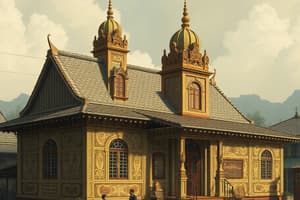Podcast
Questions and Answers
What term did the Visayans use to refer to deities?
What term did the Visayans use to refer to deities?
- Diwata (correct)
- Anito
- Lakan
- Bathala
Which document did Fray Juan de Plasencia write that is considered the first book printed in the Philippines?
Which document did Fray Juan de Plasencia write that is considered the first book printed in the Philippines?
- Las costumbres de los Tagalos en Filipinas
- Relation of the Worship of the Tagalogs
- Doctrina Christiana (correct)
- Vocabulario de lengua Tagala
What was the purpose of the reduccion policy suggested by Plasencia?
What was the purpose of the reduccion policy suggested by Plasencia?
- Resettlement of native populations (correct)
- Conversion of natives to Protestantism
- Promoting education among natives
- Collection of taxes from the natives
Which archaeological artifact signifies prehistoric indigenous burial practices in the Philippines?
Which archaeological artifact signifies prehistoric indigenous burial practices in the Philippines?
What significant aspect does the Manunggul Jar illustrate about early Filipinos?
What significant aspect does the Manunggul Jar illustrate about early Filipinos?
Fray Juan de Plasencia was known for defending the natives against which group?
Fray Juan de Plasencia was known for defending the natives against which group?
What is the significance of wooden carvings in relation to deities in early Filipino beliefs?
What is the significance of wooden carvings in relation to deities in early Filipino beliefs?
What geographical areas did the beliefs discussed encompass?
What geographical areas did the beliefs discussed encompass?
What term was originally used to refer to Spaniards born in the colony before its broader application?
What term was originally used to refer to Spaniards born in the colony before its broader application?
Which term describes the decentralized local settlements in the Philippines before Spanish colonization?
Which term describes the decentralized local settlements in the Philippines before Spanish colonization?
Who typically held the position of spiritual leader within a barangay?
Who typically held the position of spiritual leader within a barangay?
What was the primary role of the babaylan in early Filipino society?
What was the primary role of the babaylan in early Filipino society?
In the context of early Philippine history, what does the term 'indios' represent?
In the context of early Philippine history, what does the term 'indios' represent?
Which of the following statements best describes the transfer of the babaylan position?
Which of the following statements best describes the transfer of the babaylan position?
What historical navigator named the Philippines 'Las Islas Filipinas'?
What historical navigator named the Philippines 'Las Islas Filipinas'?
What was the primary basis for the barangay's political structure?
What was the primary basis for the barangay's political structure?
Flashcards are hidden until you start studying
Study Notes
Historical Context of the Philippines
- Name "Philippines" was given by Ruy Lopez de Villalobos in 1542, named after Prince Phillip II of Spain.
- The archipelago became a Spanish colony nearly three decades later, becoming part of the Spanish Empire.
- The term "Filipino" initially referred to Spaniards born in the colony before evolving to include native people.
Decentralization and Social Structure
- Prior to Islam's arrival in the 15th century and Spanish colonization in the late 16th century, the Philippines lacked powerful kingdoms or empires.
- The society was decentralized into small political units known as barangays, derived from "balangay," an Austronesian boat.
- Barangays functioned as multi-faceted institutions encompassing political, economic, social, cultural, and spiritual aspects.
Spiritual Leadership
- Spiritual life within barangays was guided by spiritual leaders known as babaylan in Visayas and catalonan in Luzon.
- Babaylans typically were female, although males could also serve, requiring them to adopt female gender roles.
- Succession to the role of babaylan was based on skill and ability rather than familial ties.
Beliefs and Deities
- Babaylans led rituals including animal sacrifices to appease local deities and spirits, believed to have the ability to transcend to the spiritual realm.
- Linguistic and geographical variations influenced the names of deities: "diwata" for Visayans and "anito" for Tagalogs.
- Deities were associated with natural forces and could be represented through objects like wooden carvings.
Cultural Artifacts and Literature
- Fray Juan de Plasencia, a Franciscan missionary, documented early Filipino worship practices and beliefs.
- He was instrumental in establishing towns and converting inhabitants to Catholicism, while also preserving cultural traditions through writings.
- Prominent works include "Doctrina Christiana," the first book printed in the Philippines, and cultural texts detailing Tagalog customs.
Archaeological Significance
- The Manunggul Jar, discovered in Palawan, is a key Neolithic artifact exemplifying indigenous burial practices and beliefs about the afterlife.
- The jar features scroll designs and a depiction of a boat journeying to the afterlife, highlighting early Filipinos' beliefs in the soul and life beyond death.
Studying That Suits You
Use AI to generate personalized quizzes and flashcards to suit your learning preferences.




